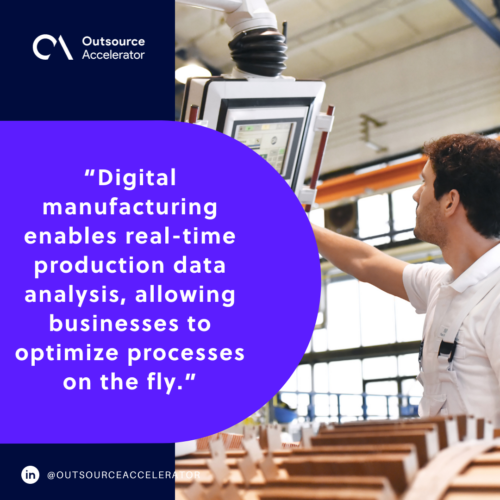How smart manufacturing can help your business

The swift advancement of technology is driving a new industrial revolution.
According to MIT Professional Education, this revolution relies on cyber-physical production systems and shakes up traditional manufacturing processes.
This is why smart manufacturing is becoming more prominent. We are already seeing it spread through smart factories and the adoption of Industry 4.0 — improving traditional manufacturing.
In this article, we explore smart manufacturing and how it can evolve businesses.
What is smart manufacturing?
Smart manufacturing, also called Industry 4.0 or the Industrial Internet of Things (IIoT), integrates advanced technologies and systems to optimize manufacturing processes. It is a data-driven, highly automated, and connected approach to production.
Modern manufacturing involves leveraging real-time data, advanced analytics, and intelligent machines to improve efficiency, productivity, and product quality.

Advantages of smart manufacturing
Implementing smart manufacturing strategies can bring many benefits to businesses:
Increased efficiency and productivity
By automating repetitive and manual tasks, smart manufacturing reduces production time, minimizes errors, and improves overall efficiency.
Deloitte research revealed that smart factory initiatives yielded around a 10 to 12% increase in productivity gains. This affected areas like manufacturing output, factory utilization, and labor productivity.
Improved quality and customer satisfaction
Smart manufacturing allows real-time monitoring and data analysis. Detecting defects and maintaining high product quality becomes easier.
By delivering consistent, fault-free products, businesses can enhance customer satisfaction and build a reputation for excellence.
Cost reduction
Companies can cut costly unplanned downtime and maintenance expenses through predictive maintenance and asset optimization.
An NIST Economic Analysis report found that smart manufacturing technology could save manufacturers around $57.4 billion annually.
Enhanced supply chain management
Digital manufacturing enables better visibility and control over the entire supply chain. Real-time data sharing and analytics facilitate accurate demand forecasting, inventory optimization, and efficient supplier collaboration.
These capabilities can reduce lead times, lower inventory costs, and improve customer responsiveness.
Flexibility and agility
With cyber manufacturing, businesses can quickly adapt to changing market demands through agile production strategies.
Manufacturers can easily reconfigure production lines by leveraging robotics and 3D printing. This allows them to offer customization options and deliver products faster.

Challenges of smart manufacturing
Smart manufacturing also presents some challenges that need to be addressed:
Data security and privacy
Safeguarding sensitive information becomes crucial with the increasing amount of interconnected devices and data exchange.
Businesses must invest in robust cybersecurity measures and ensure compliance with data privacy regulations to protect their intellectual property and customer information.
Workforce adoption and skills gap
Implementing smart manufacturing requires a trained workforce ready to embrace new technologies.
Organizations must address the skills gap and offer ongoing career development opportunities to ensure successful integration.
Interoperability and integration
Integrating various systems and technologies can be complex. Seamless communication and data exchange should be done across different devices and platforms.
Adopting open standards and leveraging interoperability frameworks becomes essential to avoid information silos and improve overall efficiency.
Technologies in smart manufacturing
Smart manufacturing relies on several key technologies to enable its capabilities:
- Internet of Things (IoT). IoT devices gather real-time data from manufacturing processes. They enable monitoring, predictive maintenance, and optimization.
- AI and machine learning. AI and ML algorithms analyze collected data to identify patterns, detect anomalies, and make predictions. They also optimize production schedules, improve quality control, and enhance demand forecasting.
- Robotics. Collaborative robots (cobots) automate tasks that are repetitive and physically demanding.
- Big data analytics. Analyzing large data volumes helps identify efficiency gaps, improve quality control, and optimize production processes.
- Cloud computing. The cloud allows the storage, processing, and analysis of vast amounts of data. It provides scalability, flexibility, and accessibility to manufacturers, regardless of their size.
Evolving businesses with smart manufacturing
Businesses need to embrace smart manufacturing to stay ahead. Here are a few distinct features of smart manufacturing technologies that are revolutionizing how enterprises operate:
Predictive maintenance
Businesses can move from reactive to proactive maintenance using smart technologies.
Manufacturers can detect machinery issues before they cause disruptions. This can be done by using data from sensors and predictive analytics. As a result, there would be less downtime and maintenance costs.
Real-time optimization
Digital manufacturing enables real-time production data analysis, allowing businesses to optimize processes on the fly.
With this, manufacturers can make data-driven decisions about adjusting production rates, allocating resources, and improving quality control.

Demand-driven production
By leveraging real-time data on customer demand, companies can adapt their production schedules accordingly. This demand-driven approach reduces inventory costs, minimizes waste, and improves customer satisfaction.
Customization and personalization
Cyber manufacturing empowers greater customization and personalization of products.
With advanced technologies, businesses can quickly respond to individual customer preferences. They can offer tailored solutions and accelerate time-to-market.
Innovate your business with smart manufacturing
Smart manufacturing isn’t just a buzzword — it’s a transformational approach to modernizing manufacturing processes. Its advantages in terms of efficiency, quality, and adaptability are clear.
Businesses can’t be left behind because we now witness a world where digital tech drives innovation. The future of manufacturing is smart, data-driven, and connected, and those who embrace it will lead the way.







 Independent
Independent




